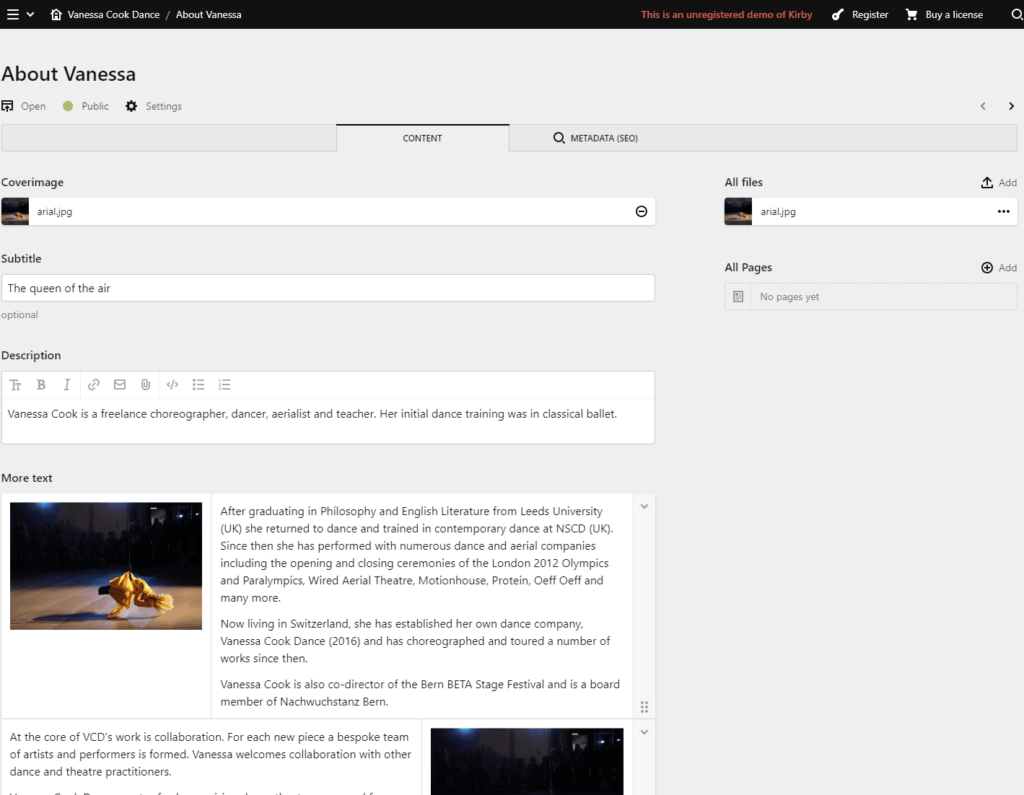Content management systems (CMS) are the backbone of many websites on the Internet. Traditionally, many CMS rely on databases to store and retrieve content. But a growing number of web developers and companies are opting for a simpler, often faster solution: the flat file CMS.
What is a flat file CMS?
A flat file CMS is a content management system that does not require a database. Instead, all data is saved in files, usually in Markdown or HTML format. This makes the systems lightweight, fast and easy to operate.
Advantages of a flat file CMS
- Easy installation and maintenance: Without a database, these systems are easier to set up and maintain. Oh yes.
- Speed: Since no database queries are necessary, pages can be loaded faster. Absolutely.
- Security: No database means less attack surface for potential threats.
- Portability: The content and structure of the website are stored in files, making it easier to move or back up. Backup can therefore be realized extremely easily using Git.
My experience with flat file systems – Grav CMS
For all my love of WordPress. For a simple one-pager, the overhead sometimes simply seemed too high and static HTML too cumbersome. In addition, forms, for example, were only ever possible with difficulty and using external services. A simple CMS is needed. A simple CMS for simple websites.
My first flat file CMS experience was with Grav CMS, which was over a decade ago.
Grav CMS is a modern, flat file CMS that is characterized by its flexibility, speed and ease of use. Developed in PHP, Grav CMS does without a database and stores all content in a flat file structure. This enables easy installation and maintenance as well as lightning-fast loading times.
Grav CMS is open source and therefore free of charge. Technically flawless, the usability takes a bit of getting used to (as with so many open source projects). As a result, this simple CMS never really caught on with Wundernetz.

Kirby CMS, the perfection for simple CMS
Kirby CMS is a flexible and user-friendly flat file CMS developed in PHP. It is characterized by its simplicity and adaptability and is ideal for developers looking for a powerful but easy-to-manage website platform. Kirby does not require a database and stores all content in text files, which simplifies setup and maintenance. With an intuitive admin panel and a wide range of plugins and themes, Kirby is a versatile choice for projects of all kinds, from blogs to complex corporate websites.
What’s more, Kirby has fast support and has been able to help us so often. The usability and support comes with a price, but a very reasonable price: $100 for a license. Especially in a professional environment, this is absolutely justifiable and I am very happy to pay it.
We are of course delighted that we have already been able to successfully implement several Kirby websites.
But there are even more simple CMS
Here is a list of other systems. I have to admit that I haven’t tried all of them.
- Jekyll: A system written in Ruby that is particularly popular for static websites and blogs. It integrates seamlessly with GitHub Pages.
- Hugo: An extremely fast FlatFile CMS, developed in Go. It is known for its performance and is ideal for blogs, documentaries and more.
- Statamic: A PHP-based flat file CMS that is characterized by its simplicity and flexibility. It also offers optional MySQL integration.
- Pico: A lightweight FlatFile CMS in PHP that focuses on simplicity. It is ideal for smaller websites and personal projects.
- Yellow: A simple, file-based CMS that requires no configuration and is particularly suitable for smaller websites.
- OctoberCMS: Although primarily database-based, it also offers a flat file mode. It is written in PHP and is suitable for developers who are familiar with the Laravel framework.
- Flextype: An open-source FlatFile CMS that works with modern technologies such as YAML and Markdown and offers a simple API for developers.
- GetSimple CMS: An XML-based flat file CMS known for its simplicity and ease of use. Ideal for small websites.
- WonderCMS: A minimalist FlatFile CMS that is stored in less than 10 files and requires no configuration.
Conclusion: The diversity of the flat file CMS world
As you can see, there is an impressive selection of flat file CMS that can cover a wide range of needs and requirements. From super-fast blog platforms like Jekyll and Hugo to versatile, user-friendly systems like Kirby and Statamic, the possibilities are almost endless.
The choice is yours. It doesn’t always have to be WordPress or Joomla, but can also be something different. There are plenty of good reasons. We will of course be happy to help you with your choice.

